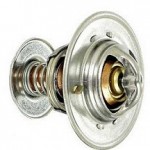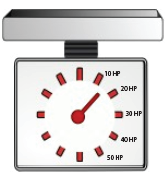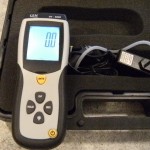Popular Posts
- Don't Block or Remove the EGR Valve, It's Saving You Money
- Keep Your Engine Alive: The Importance of Oil Temperature
- Low Temp Thermostats: What's the Advantage?
- Wheel Tech, Part III: Wheel Diameter's Effect on Performance
- Beating the Heat: Advantage of a High Pressure Radiator Cap
- How to Compare Weight Savings to Horsepower Gains
- Check Your Engine's Health: With a Vacuum Gauge
- Wheel Tech, Part II: Width Matters
- What's So Wrong With Nitrous?
- Stiff Stuff: Strut Bars and Braces
Resources & Classes
-
Category Archives: Engine
MAF vs Differential Pressure for Intake Testing
If you haven't read anything of mine on measuring intake restriction, you'll want to read this series first before you read this.
A subscriber, John Marlow, recently submitted a question that I thought I'd take a few moments this week to talk about. I also saw a similar question out on one of the forums that had linked to an article here so I figured it was worth talking about.
"Why not just measure intake restriction using an OBDII tool to read MAF (Mass Air Flow Sensor) values (on cars equipped with a MAF) and determine if flow is better that way?" -- John Marlow, Topeka, KS
Thanks John for your question!
This is actually really good thinking and using the MAF to see if a modification helped or not would be better than the "butt dyno", but I still lean on the differential pressure meter for some reasons I'll discuss in this article.
As long time readers know, I like to use a differential pressure meter (or vacuum gauge, or digital manometer) to measure restriction in the intake system to guide modifications to that system. I like to use this rather than the MAF sensor because with a differential pressure meter, I can take measurements at different points in the system while the MAF only allows an overall figure. If I want to know if a particular bend is restrictive or if the resonator box is causing the problem, I can use the DPM (differential pressure meter) to measure the pressure drop across those parts individually and figure out which is the culprit of my flow loss.
The MAF measures a few different things while differential pressure only measures pressure drop which makes MAF readings less repeatable which is important for "scientific" modification. MAF readings are also much harder to measure on a OBDI (pre-1996) car.
So let's unpack some of these points a little bit to make more sense of them.
Posted in Engine
Comments Off on MAF vs Differential Pressure for Intake Testing
Low Temp Thermostats: What’s the Advantage?
 This week we're talking about low temperature thermostats, another item that nearly every tuning house sells and yet fail to really explain what they're for. A few months back, we talked about high pressure radiator caps and what advantage they offered, this time though we're looking at a part that is far more perplexing.
This week we're talking about low temperature thermostats, another item that nearly every tuning house sells and yet fail to really explain what they're for. A few months back, we talked about high pressure radiator caps and what advantage they offered, this time though we're looking at a part that is far more perplexing.
Here are a few descriptions from websites/manufacturers selling these, notice the trend of extremely vague language: (more…)
Posted in Engine
2 Comments
Header Design Secrets: Interview with John Grudynski of Hytech Exhaust
This past week I interviewed John Grudynski, the owner, artist, and innovator behind Hytech Exhaust.
John has been designing and building race headers for many major racing series and organizations such as SCCA, USAC, Trans-Am, World SportsCars, Dirt Track and NHRA Drag racing for nearly 30 years. He is easily one of the foremost experts on the "black art" of Header design and has an incredible reputation in motorsport and in the aftermarket.
John has also developed some seriously impressive aftermarket headers for cars such as the Honda Integra Type-R (which gained almost 20hp over factory), the Eclipse V6, the RSX Type-S and many more.
 John also earns the distinction of being recognized as one of the Tuner University Certified Experts and the first to receive the honor. This honor is one given only to companies and individuals who have earned their stripes and demonstrated unique abilities and innovations in motorsport, OEM, and aftermarket parts/services.
John also earns the distinction of being recognized as one of the Tuner University Certified Experts and the first to receive the honor. This honor is one given only to companies and individuals who have earned their stripes and demonstrated unique abilities and innovations in motorsport, OEM, and aftermarket parts/services.
Posted in Engine, TU Premium
1 Comment
How to Compare Weight Savings to Horsepower Gains
 Have you ever wondered what 10 or 20 extra horsepower might "feel" like in your car?
Have you ever wondered what 10 or 20 extra horsepower might "feel" like in your car?
Maybe you've wondered how removing 100lbs will affect your car in terms of how much horsepower you'd have to gain to accomplish the same thing.
These questions are wise to ask because they can be used to make significantly better modification choices and frankly it can be fun to "simulate" different modification scenarios.
For example, if I could buy a carbon fiber hood that weighs 20lbs less than factory, it'd be nice to be able to view that weight loss in terms of horsepower. In other words, how many horsepower would I need to gain in order to accomplish the same thing as losing 20lbs? (Hint: it's pathetically little)
What if I wanted to determine if a dual exhaust system is worth while? How much more power would I have to make to offset the extra 20lbs? (in a 3500lb car with 215 hp, not even 1.25hp, so probably do-able)
Can someone on the forum claiming to feel a 1-2hp gain on their butt dyno really do so? Well, using this formula you'd see that they'd have to be able to feel the difference between having groceries in the car vs not having groceries in the car to "feel" that supposed gain.
What about if I wanted to see how much weight I'd have to lose to compete with the same car with 50 extra horsepower?
All of these kinds of questions can be answered with the simple math in today's article.
Posted in Engine
3 Comments
More Bad News for “Drop-In Air Filters”
In previous testing, which I don't believe I ever posted here, in my IS300 I found that there is actually MORE restriction created by the aFe filter for the IS300 (due probably to the construction of the filter - more on that in a later article if I can find the pictures).
The HKS air filter (foam) flowed -slightly- better, but by slightly better, I mean less than 0.1 inches of water better which is so little that it literally makes no difference at all. The K&N was a similar story to the aFe.
I don't care what your butt dyno says because frankly, it's the most deceptive thing on the planet and you can't feel a 1-2hp difference... no matter how good you are.
But there's worse news for the drop-in filter crowd. Unfortunately, as expected, they also filter a lot worse than the factory paper air filter. Over time, that means more wear on your engine. Enough to matter? Maybe not, though some foam filters are pretty awful and I can only imagine how bad those cheap eBay conic filters are.
Posted in Engine
2 Comments
How much Horsepower Can My Engine Make?
Without adding forced induction, many people want to know how much horsepower their car can make. Typically there's some pretty wild theories about how to get there and what that figure might be. However, there's a very straight forward way to figure out the theoretical maximum for your street car (as long as boost is not involved).
Volumetric efficiency is a term that (basically) refers to the ability of an engine to convert air and fuel into power. More accurately, it's the engine's ability to make use of the available air around it.
Posted in Engine
3 Comments
A Better Way to Compare & Anaylze Engine Efficiency
People often talk about horsepower per liter when they're comparing two engines. For example, you might say that the JDM B18C engine in the Integra Type-R produced 210hp from 1.8 or an impressive ~ 117 hp per liter. You may then be tempted to look at an engine like the 2JZ-GE found in project Lexus and scoff at it's 215hp from 3.0L, which is a mere ~ 72 hp per liter. Many IS300 owners are previous Honda guys, so, naturally, this is a very common 'scoff' :).
However, there is a better method to compare two engines (and also figure out how 'developed' an engine already is) which while also with its faults will give you a much better idea of what you're dealing with.
BMEP is one of many figures that you can use to compare engines. It stands for Brake Mean Effective Pressure and it refers to the amount of average pressure generated on the piston during combustion. BMEP gives us a much better idea of how 'developed' an engine is, how much stress/pressure is on the engine internals, and to some degree, how effective that engine is at converting gasoline to power. While this article mostly deals with Naturally Aspirated engines, it can also be used on forced induction engines - however, note that the BMEP values for these engines will be much much higher.
Posted in Engine
9 Comments
The 5 Best Bang for Your Buck Mods
If I could do only 5 performance modifications to a car, with cost being a consideration, and perhaps also wanting to strongly avoid "ruining" the car, what would I do?
Posted in Braking & Handling, Engine
4 Comments

